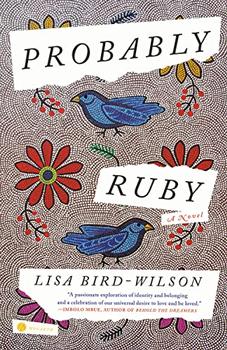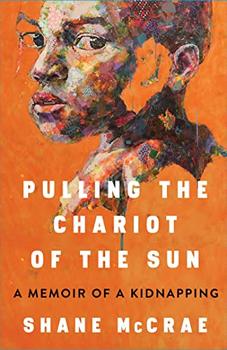Summary | Excerpt | Reading Guide | Reviews | Beyond the book | Read-Alikes | Genres & Themes | Author Bio

A Novel
by Lisa Bird-WilsonLisa Bird-Wilson's debut novel Probably Ruby opens with the titular central character meeting with her therapist, Kal, and considering how she might transition their relationship into romantic terrain. Kal is Métis, like Ruby, and through a conversation about their childhoods, it is revealed that she "didn't grow up with her 'real' family." After her unsuccessful attempt to seduce Kal, Ruby goes to a bar, where she runs into and goes home with an old flame. These interactions introduce Ruby as someone desperate for intimacy, particularly with other Native people. In a later session, she tells Kal about her fear that "people she loved might just disappear or be withdrawn at any moment." This feeling is at the center of Bird-Wilson's complex, searching and often very funny protagonist.
The novel unfolds as a collection of interrelated stories about Ruby, as well as characters central to and on the periphery of her life. We learn that Ruby's mother was white and her father Métis, and that she was adopted by a white couple as a baby. The nucleus of Ruby's life is the lack of knowledge about her roots, her "real family." As a child, she makes up fictions about these unknown relatives, and as an adult she hangs pictures of Native strangers in her home and tells her children they are family. "She created a mythology for them," the narrator explains, "To try and save her kids from the longing she'd felt her whole life."
The chapters are non-linear, advancing and retreating through Ruby's life in a disjointed fashion, many revolving around her romantic relationships. In high school, she runs away from home with her boyfriend, but she cannot outrun her fixation on the murder of a Cree man, Leo LaChance, by a white supremacist (see Beyond the Book). She becomes entangled with both men and women throughout adulthood, sometimes simultaneously. She appears in and disappears from people's lives, seeking to fill the empty space that is her desire to know where she came from and, consequently, herself. She comes to know members of her biological family, but by the time she makes these connections, her father has been dead for 16 years. She is haunted by grief for this person she never knew, but who was an intrinsic part of herself. At the same time, she is heartened by her relationship with her maternal grandmother, Rose, a woman whose tenacity and tendency to flee her troubles Ruby finds relatable. Bird-Wilson's background as a poet is apparent in her rich, evocative language. Rose longs to return to the home of her birth, "Where the sound of shaken leaves on dry branches ripped across the acres like soft gossip." Chapters that feature the perspectives of Ruby's biological mother, father and other relatives heighten the book's complexity, showing the reader where Ruby has come from in ways she cannot access herself.
Probably Ruby is a deft work of characterization. Though some might find the novel's disordered structure a challenge, it is effective in exhibiting Ruby as the sum of her parts — a person affected by intergenerational trauma and a history she cannot fully know. Without knowledge of where and who she came from, Ruby takes a circuitous path around her own life. There is a depth of feeling to this journey that refuses convention. She meets her Native family, but she does not suddenly become whole. She must continue to exist in the margins, in a society where she is not valued and in a family where she does not fully belong. It's a refreshingly honest account of cobbling together a self out of disconnected parts, successfully but imperfectly.
![]() This review was originally published in The BookBrowse Review in April 2022, and has been updated for the
January 2023 edition.
Click here to go to this issue.
This review was originally published in The BookBrowse Review in April 2022, and has been updated for the
January 2023 edition.
Click here to go to this issue.

If you liked Probably Ruby, try these:

Pulling the Chariot of the Sun
by Shane McCrae
Published 2023
An unforgettable memoir by an award-winning poet about being kidnapped from his Black father and raised by his white supremacist grandparents.

by Aaron John Curtis
Published 2025
A coming-of-middle-age novel about an Ahkwesáhsne man's reluctant return home and what it takes to heal.
Your guide toexceptional books
BookBrowse seeks out and recommends the best in contemporary fiction and nonfiction—books that not only engage and entertain but also deepen our understanding of ourselves and the world around us.